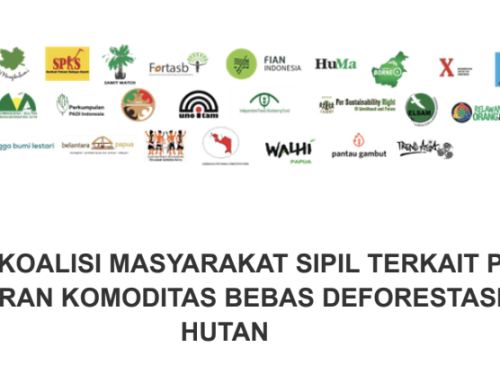Bogor, 08 November 2019. A report from the Independent Forest Monitoring Network (JPIK) titled – PHPL: From Legality to Sustainability – exposed challenges of sustainability on Sustainable Production Forest Management (S-PHPL)-certified Timber Forest Product Utilization Business Permit on Natural Forest (IUPHHK-HA) concession. It is threatened by coal mining and palm oil plantation activities, and forest fires.
Issue on overlapping land and forest management in Central and East Kalimantan Province is a serious threat for IUPHHK-HA concession operations, loss of natural forest and emerging social conflict. From total of 7.2 million hectares IUPHHK-HA concessions, around 2.6 million hectare or 30% of it overlapped with mining, palm oil, and Industrial Plantation Forest (HTI). Deforestation caused by those activities and is not part of forest management practices. However, figure of deforestation happened inside IUPHHK-HA concession, on areas that is not overlapped with other concession found to be quite high, with total of 101,503 hectare.
Furthermore, forest fires also causing loss of natural forest cover. Hotspot analyses from 2014 – 2017 on those two provinces have found 1,572 hotspots inside IUPHHK-HA concessions with S-PHPL certification. Most of those forest fires happened in 2015 when extreme El Nino phenomenon happened. Analyses from satellite image also showed that in 2019, forest fires happened in 5 IUPHHK-HA concessions in Central Kalimantan Province and two concessions in East Kalimantan Province. Moreover, JPIK monitoring activities during period of 2014-2017 have found that problems on concession boundary remain unsolved. Conflict on boundary recognition is still happening without clear resolution”, said Muhamad Ichwan, JPIK Campaigner.
Despite land overlapping, deforestation, forest fires and social conflict cases issues, all PHPL concessions audited by Certification Body (LS) during 2015 – 2017 period showed good results. JPIK understands that existing logic of LS on playing their roles is a government policy that impacted the integrity of concession territory and environment coherence considered as out of concession control. Therefore, it does not considered in audit and surveillance conducted by LS. It is similar when LS considers policies on land use or forest management plan that have been approved officially by the government are considered as given legality and not being questioned during assessment.
Asti Maulita, JPIK Researcher confirmend that those audit approaches are incorrect because our research showed that government external policies and regulations related to land-forest permits basically form/ impact environment condition inside concession. JPIK found that PHPL-certified IUPHHK-HA concessions have considerable potentials to manage forest in a sustainable way – with preconditions that it is free from unsynchronized governments policies.
Pulling the impact out from consideration of concession performance, could be seen as weakness of assessment conducted by LS. Moreover, there are other weaknesses on PHPL assessment standard that must be improved so that sustainabillity of PHPL can be achieved. Some of them are on certainty of IUPHHK-HA area, especially on several critical verifiers related to availability of legal document and boundary administration, and multi-stakeholder recognition on forested IUPHHK area that is co-dominant (do not have big impact on assessment). Furthermore, norms or values of verifier maturity are still based on fulfillment/ availability of documents.
JPIK considers that natural forest concession is Indonesia’s huge asset that potentially improve environment condition. However, it needs government policy related to coherent land usage and strong audit by LS. Therefore, JPIK recommends that:
- The government and related stakeholders to end land conflict, overlapping, and destruction of concessions for other national strategic objectives. One Map is expected to facilitate clean-and-clear PHPL and S-LK concessions.
- The Government of Indonesia must consider to erase IPPKH and conversion permit for palm oil step by step. This main factor destroys commercial forest concessions in every way. Those permits are also causing continuous forest conversion that are contradicted with the government’s commitment related to climate change.
- Standard and criteria to evaluate PHPL concessions must be improved to ensure that LS considers all aspects, both internal and external that impacting a concession when they conduct assessment, surveillance, and/or monitoring.
- Specifically, the important aspect that needed to be revised related to assessment standard are indicator (1.1) on certainty of area and indicator (1.5) on agreement based on free-prior-informed consent, and indicator (3.2) on forest protection and security.
- Concessions that own S-PHPL and S-LK must improve their performance, especially related to full portrait of management, conflict resolution and control of the concession integrity and fires prevention.
Editor’s Note:
- JPIK is an Indonesia’s Independent Forest Monitoring Network that agreed and declared on 23 September 2010. To date, JPIK consists of 54 Non Government Organization spread across Aceh to Papua. Establishment of JPIK is a commitment from Indonesian civil society to actively contribute towards better forest governance.
- JPIK report “PHPL: From Legality towards Sustainability” can be downloaded through this link: downloaded.
Contact for Interview:
Muh.Ichwan: 0815 5650 859; ichwan.jpik@gmail.com
Asti Maulita: 0815 9304 041; asti.jpik@gmail.com






